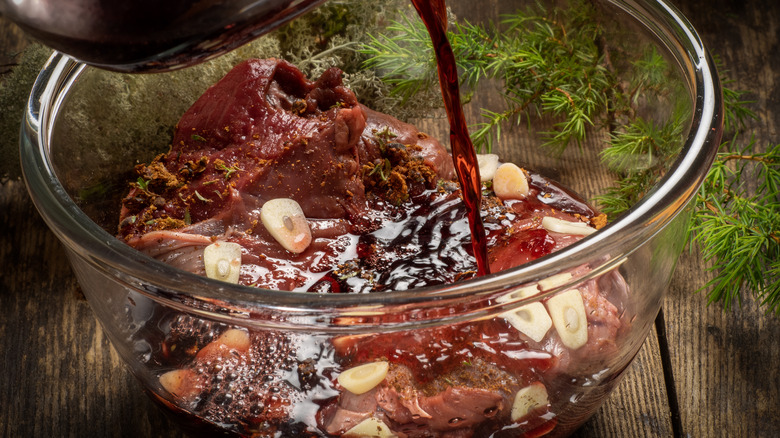The Meat Marinade Myth You Should Stop Believing
Recipes for meat marinades abound and include a variety of flavors. You can enjoy a spicy marinade with lots of chiles, a sweet and sour sauce with vinegar or citrus juice, and even a sweet, sticky brown sugar honey medley. Many recipes for grilling call for marinating meat, poultry, and even some fish before you cook them. Meat marinades do have some uses in the kitchen, but they are not a complete solution to cheaper cuts of meat.
The science behind marinades is that they are a combination of oil, acid, and seasonings, such as salt, herbs, and spices. It's true that salt can change the concentration of liquid between the marinade and the meat. Some liquid is pulled out of the meat, which combines with the flavors, and is then pulled back in through osmosis, up to a point, according to Discover Magazine. And oil helps carry flavors into the meat that dissolve in fat, such as thyme, rosemary, and sage, says Cook's Illustrated.
But what does the acid do? It does have a function, but that's where the one meat marinade myth that you should stop believing lives.
Do marinades tenderize meat?
Meat is muscle, and it's made of protein, water, carbs, fat, and connective tissue fibers such as collagen and elastin, per Exploratorium. And it's the collagen and elastin that can make the meat tough. Cheaper cuts of meat, such as brisket and flank, have lots of these types of fibers because they come from the areas on the cow and pig that move, according to Martha Stewart. And those are the fibers you need to break down for the meat to become tender.
The myth is that meat marinades tenderize the cut all the way through, but Cook's Illustrated says they don't. Acids do "denature," that is, unfold proteins, which is what collagen and elastin are, but they cannot penetrate through the dense meat.
In fact, if you leave meats in marinades too long, what will happen is that the exterior of the meat will break down too much and get mushy, which is very undesirable. Who wants to sink their teeth into mushy meat?
What does tenderize meat?
The best way to tenderize meat is in how you cook it, per The Washington Post. Braising, stewing, and slow cooking breaks down the collagen into gelatin, which is smooth and silky. Gelatin not only makes the meat tender, but it thickens juices so you get meltingly tender meat and a thicker sauce.
You can help marinades along by slicing meat before you marinate it, notes Cook's Illustrated. That will give the marinade more meat to work with, and it will be able to reach more areas of the meat before cooking. And it will make the meat more flavorful too.
Some meats are injected with marinades and brine before they are sold. This does help tenderize tough cuts and adds moisture, but you have to cook these types of meats to a safe final internal temperature because bacteria on the surface can be pulled into the center of the meat, per the USDA. Same with meats that are pierced with needles; that breaks down the fibers, but draws bacteria to the middle.
Now that you know the secret to tender meat is in the cooking process and not the marinade, try this slow-cooked beef brisket recipe for your next family dinner.


